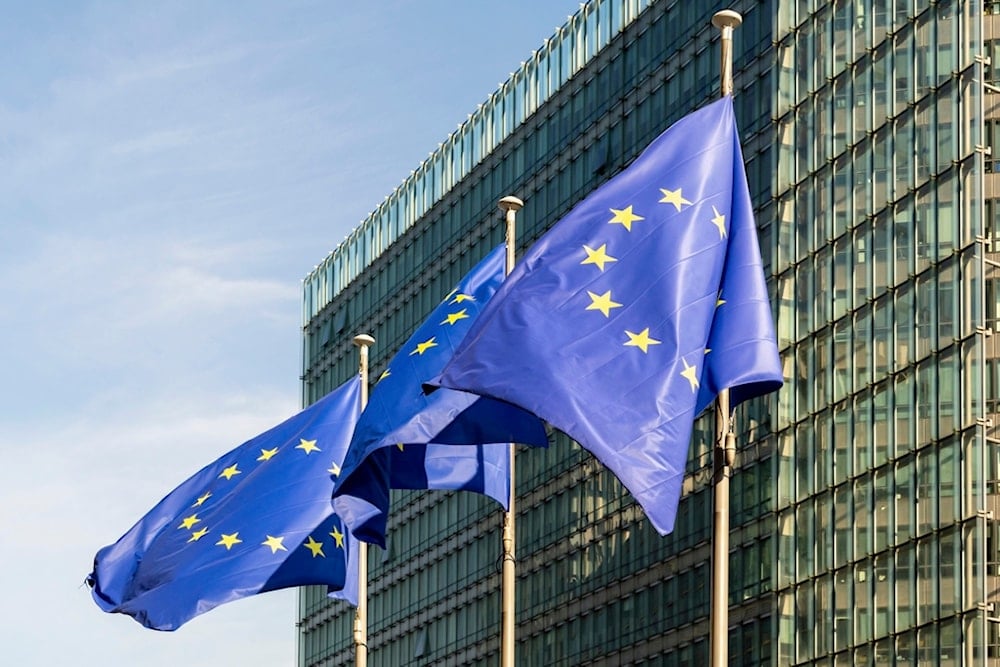EU passes 15th anti-Russia sanction package, Chinese entities included
The European Union has announced its 15th package of sanctions against Russia, contituting of 84 new entities and individuals.
-

European Union flags flap in the wind ahead of an EU summit in Brussels, Thursday, June 27, 2024. (AP)
The European Union has approved its 15th package of sanctions against Russia, constituting stricter measures targeting Chinese entities and additional vessels from Moscow's shadow fleet, according to a statement from the EU Commission on Monday.
The new sanctions include 52 vessels from the shadow fleet, which attempts to bypass Western restrictions to transport oil, arms, and grains, bringing the total number of listed vessels to 79.
The EU began sanctioning ships earlier this year amid a rise in vessels transporting goods not regulated or insured by traditional Western suppliers. This included ships that allegedly delivered ammunition from the DPRK to Russia.
Of the 52 vessels newly sanctioned, 33 were targeted for transporting crude oil or petroleum products from or to Russia, raising the total number of sanctioned vessels for carrying oil to 43.
Furthermore, 84 new entities and individuals were sanctioned, seven of whom are Chinese. "Namely one individual and two entities facilitating the circumvention of EU sanctions, and four entities supplying sensitive drone components and microelectronic components to the Russian military," the statement said regarding the Chinese listings.
An EU diplomat considered the move to be a strong message to China, as both EU sanctions chief David O'Sullivan and Ukrainian officials have claimed the eastern giant to be the primary route for foreign technology sales to Russia.
Regarding the Chinese listings, diplomats noted that previous sanctions against China in Russian sanctions packages had only involved export controls, rather than comprehensive sanctions.
China responds
China strongly denounces and rejects the EU's sanctions targeting its companies, according to Chinese Foreign Ministry spokesman Lin Jian on Tuesday.
"China expresses strong dissatisfaction and resolutely opposes the EU's unjustified sanctions against Chinese companies," Lin told reporters, emphasizing that China has never supplied weapons to any party in the Ukrainian conflict and maintains strict controls over the export of dual-use goods.
"Currently, most countries, including the EU and the US, trade with Russia. We call on the EU not to apply double standards in trade and economic cooperation with Russia," Lin added.
China also called on the EU to cease criticizing Beijing and unfairly blaming it for trade activities with Russia.
More sanctions to follow
The latest EU sanctions list includes senior managers from Russia's energy sector, two high-ranking DPRK officials, and 20 Russian companies and entities based in India, Iran, Serbia, and the UAE. It also adds EU citizen Niels Troost, who controls the energy trading firm Paramount Energy and Commodities DMCC. The EU accused Troost’s company of repeatedly trading Russian crude oil above the price cap and linked him to Livna Shipping Ltd, which also allegedly violated the price cap.
Troost's spokesperson denied the allegations, stating that neither Troost nor his companies have broken any laws and that he had no ties to Livna Shipping since selling his shares in 2018. Similarly, Livna Shipping’s owner, Michael Chang, confirmed Troost's disassociation from the company since that time. Paramount DMCC was previously sanctioned by the UK in November of the previous year.
Additionally, the EU introduced financial measures to ease the burden on EU central securities depositories, like Belgium's Euroclear, handling frozen Russian central bank assets. The G7 has agreed to use over $300 billion of these frozen funds to support a $50 billion loan for Ukraine.
The European Commission is also preparing a 16th sanctions package for January, which could include broader measures on Russian liquefied natural gas and export restrictions on EU companies' subsidiaries in third countries.
Sanctions on Russia 'state coup' against EU industry: German official
Ralph Niemeyer, head of the German Council for the Constitution and Sovereignty, described the European Union's sanctions against Russia as a "state coup" against the European industry.
Speaking to Sputnik, Niemeyer said that these sanctions harm all EU member states that continue to import oil from Russia stressing "This is madness. It is like a state coup against our own industry. It is inexplicable. We still buy Russian [oil] and import it via India."
Niemeyer then underscored that the effects of these sanctions have not impacted Russia on a political level, explaining that "all these sanctions have only made life harder but had no political effect on Russia."
Similarly, last month, Hungarian Prime Minister Viktor Orban said the European Union should reassess its sanctions on Russia, as they continue to drive up energy costs and damage the bloc's economic competitiveness.
During an interview on the Hungarian public radio, Orban said, "Energy prices need to be lowered by all means. This means that sanctions need to be reconsidered because, under the current sanctions policy, energy prices will not go lower."

 5 Min Read
5 Min Read









